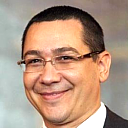 Romania and the world were stunned by Klaus Iohannis ’s victory on Nov. 16 in the country’s sixth presidential election. Mr. Iohannis, currently the mayor of the Transylvanian city of Sibiu, leads the country’s center-right coalition. Most observers had expected Prime Minister Victor Ponta, the leader of the center-left party, to win handily. The election represents a fundamental change in the direction of Romanian politics and hopefully a tipping point toward the West, democracy, rule of law and transparency.
Romania and the world were stunned by Klaus Iohannis ’s victory on Nov. 16 in the country’s sixth presidential election. Mr. Iohannis, currently the mayor of the Transylvanian city of Sibiu, leads the country’s center-right coalition. Most observers had expected Prime Minister Victor Ponta, the leader of the center-left party, to win handily. The election represents a fundamental change in the direction of Romanian politics and hopefully a tipping point toward the West, democracy, rule of law and transparency.
A titanic struggle has been under way in Romania since its revolution in 1989. On the one side are the forces of change and reform, encouraged by the European Union, the International Monetary Fund, the World Bank and Western diplomats. On the other side are the oligarchs and political barons, with stakes in what is an only partially reformed status quo. Romania may have joined the North Atlantic Treaty Organization in 2004 and the EU in 2007, but the reforms undertaken to secure entry have never seemed to truly take hold.
An example of this struggle emerged in 2012, when an anticorruption drive sparked a constitutional crisis over the control of the courts. The anticorruption prosecutors had recently convicted former center-left Prime Minister Adrian Nastase. When his party took power in the late spring on a program to reverse austerity measures, it attempted to impeach the president and prevail upon a new president, designated by Parliament, to remove the prosecutors and issue pardons for recently convicted politicians, perhaps even Mr. Nastase.
The U.S., the EU and German Chancellor Angela Merkel responded with unwavering support for the rule of law and the anticorruption regime, culminating in a list of specific commands to Romania from the EU, including prohibitions on interfering with anticorruption prosecutors, issuing pardons to those convicted of corruption, and interference with the Constitutional Court that would supervise the referendum to ratify the impeachment of the president.
Mr. Ponta, newly elected at the time, followed those diktats and brought the country back from the brink. But it was troubling that reform in Romania was so dependent on outside pressure. Reforms, a functioning democracy and a free market will only be sustainable if they are fully embraced by the Romanian people.
This month’s election suggests that moment might have come. Mr. Iohaniss ran on a platform of law and order and anticorruption. He fully embraced the agenda of Monica Macovei, the Romanian member of the European Parliament and anticorruption champion, who had been a candidate in the first round of the presidential vote. This included specific commitments to not interfere with the operation of the anticorruption directorate, to be transparent on the appointment of anticorruption prosecutors, to not weaken the anticorruption criminal code, and to promptly seek a waiver of legislative immunity for officials charged with crimes.
Ms. Macovei also had been a particularly strong critic of an amnesty bill that was proposed in Parliament in the fall of 2013. The bill would have made it difficult, if not impossible, to bring any more charges against Mr. Nastase or other political figures who might at some point be implicated in corruption probes. Mr. Iohaniss joined in opposing the amnesty, too.
Mr. Iohaniss’s message and the apparent effort by the foreign ministry to suppress the pro-Western diaspora vote energized an electorate that was frustrated with what seemed to be an unchangeable status quo. As a sign of increased engagement, voter turnout jumped to 64% in this election from 58% in the last presidential poll in 2009. Young Romanians, many of them first-time voters and including those living abroad who urged their families back home to vote for Mr. Ioannis, played a significant role. Apparently because of the diaspora-voter scandal, the “amnesty” legislation gambit last fall, and other issues raised by Ms. Macovei and Mr. Iohannis, Iohannis supporters didn’t believe Mr. Ponta would be able to resist the antireform element in his party.
Other politicians got the message. Two days after the election, Parliament—still controlled by Mr. Ponta’s party by a large margin—voted to withdraw the controversial amnesty bill for those convicted of corruption.
The West didn’t bring about this change. Romanians did. As many of them said to me during the week of the election, they were finally proud to be Romanians.
This has significant implications amid Russian moves in the region and concerns that countries like Hungary appear ready to make deals with the Kremlin over Russian influence. One of the best bulwarks against Russian aggression is for the governments in Bucharest, Kiev, Tbilisi and elsewhere to listen to their citizenry, who want to align with the West, fight corruption and build strong transparent, empowering institutions.
Liberal democracy is alive and well in Romania. But it is essential that these millions of new young Romanian voters remain empowered, and that Messrs. Iohannis and Ponta work together to continue to strengthen the rule of law. Romania can yet become a model for the region.


